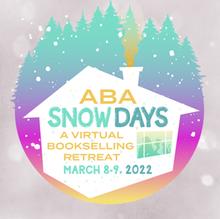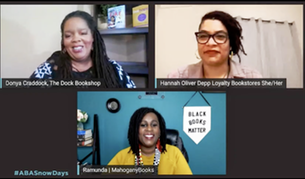 On the first day of the ABA's Snow Days conference, three Black female bookstore owners convened to discuss their stores, their missions and their experiences. Hannah Oliver Depp, owner of Loyalty Bookstores in Washington, D.C., and Silver Spring, Md., led the conversation with Donya Craddock, co-owner of The Dock Bookshop in Fort Worth, Tex., and Ramunda Young, co-owner of MahoganyBooks in Washington, D.C., and National Harbor, Md.
On the first day of the ABA's Snow Days conference, three Black female bookstore owners convened to discuss their stores, their missions and their experiences. Hannah Oliver Depp, owner of Loyalty Bookstores in Washington, D.C., and Silver Spring, Md., led the conversation with Donya Craddock, co-owner of The Dock Bookshop in Fort Worth, Tex., and Ramunda Young, co-owner of MahoganyBooks in Washington, D.C., and National Harbor, Md.
Young recalled that years ago she worked at a big-box bookstore that would "remain unnamed" and was "always amazed" by the limited selection of books by and about Black people on its shelves. Customers had to "hunt" for those titles and seeing that lack of representation stuck with her. Around 15 years ago she and her husband, Derrick Young, started MahoganyBooks as an online store, with the mission of making "Black books accessible no matter where you lived in the United States." The store is named for the couple's daughter, Mahogany; in 2017 they opened their first bricks-and-mortar location in D.C. and last year they opened in Maryland.
Craddock opened her store in Fort Worth in 2008, at a time when the area was a book desert. There was "something missing" in the community, and she noted that no community can thrive "without the education and knowledge that is needed to elevate." She described the store's early years as "tough," saying it was something of an uphill battle trying to challenge the typical mindset in Texas and the state's very long Confederate history. Through the books she carries at her store Craddock and her team try to "challenge that history" while also retelling Black history proudly and un-apologetically.
 Depp noted that as a Black bookstore owner one never makes a "business decision in isolation." In addition to the existing difficulties of running a small business in America, every choice made in the store suddenly carries extra weight. Young agreed, saying that while some booksellers have the luxury of being able to make purely aesthetic choices about things as minor as tablecloths and scented candles, she considers every choice through the lens of how it will affect and reflect her community.
Depp noted that as a Black bookstore owner one never makes a "business decision in isolation." In addition to the existing difficulties of running a small business in America, every choice made in the store suddenly carries extra weight. Young agreed, saying that while some booksellers have the luxury of being able to make purely aesthetic choices about things as minor as tablecloths and scented candles, she considers every choice through the lens of how it will affect and reflect her community.
Recalling a situation in which a white UPS driver complained that her store's inventory was "not diversified enough" because of the emphasis on Black authors and stories, Craddock pointed out that Black booksellers, whether they want to or not, are frequently put in the position of educating white people about their own biases and having to "retrain that thinking." (Craddock added that she did eventually connect with that driver over grilling, which in Texas knows no boundaries.)
Depp said the sorts of conversations that can occur when a white person enters a space in which they are not centered for the first time are common enough that they are part of her staff's training and in her staff handbook. Young added that her customer base is a mix of locals and tourists, and the number of people who aren't Black that walk in, see the store's Black Books Matter sign and walk out amazes her.
They also discussed the curatorial work that goes into running a Black bookstore. Observing that the model for Black bookstores formed largely "outside of New York publishing," Depp said that bringing in the right books still often entails going outside of mainstream publishing. Young called it "very intentional work" and definitely a "labor of love." She tries to buy from smaller Black presses as often as possible, some of them lacking robust websites. In some cases, she remarked, she's even had to drive to them to pick up the books. Craddock said she likes to highlight newer writing and classics, as well as authors and titles that have been long overlooked, and to acquire the latter "you have to really dig for that information."
The conversation turned to activism and community building, with the panelists agreeing that the sheer amount of offers and outreach can be "overwhelming sometimes." Depp said that anything she agrees to has to "come back to the book" in order to protect her time and energy. Young said many of her efforts are guided by community needs and community feedback; these include anything from putting together book lists for teachers and pastors to hosting gatherings of Black entrepreneurs in the pre-pandemic days. Craddock emphasized that sometimes the work involves simply being there and being a place where community members can gather and talk in the wake of tragic events.
On the subject of whether a bookseller has to be an owner to make change, Depp said that the books a frontline bookseller handsells or recommends can be enough to "change someone's life." Book Twitter, Bookstagram and regional bookseller associations are all places where booksellers can get involved and start to make change. "Your voice absolutely does matter." --Alex Mutter

